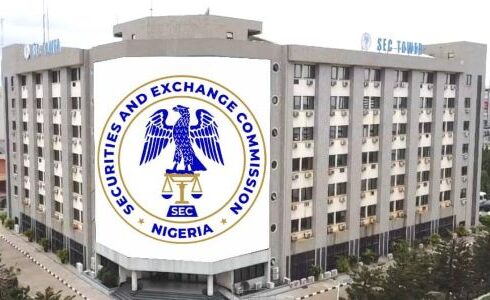
The Securities and Exchange Commission (SEC) has announced a collaboration with the Central Bank of Nigeria (CBN) and the Economic and Financial Crimes Commission (EFCC) to track and freeze illicit digital wallets used for money laundering and other financial crimes.
The Director-General of the Commission, Dr. Emomotimi Agama, disclosed this in Abuja while addressing participants at the Abuja Journalists Academy during a lecture on “The Regulation of Digital Assets and Virtual Asset Service Providers in Nigeria.”
Represented by the Head External Relations Department of the SEC, Mrs. Efe Ebelo, Agama said the partnership marked a major step in protecting investors and strengthening integrity in Nigeria’s fast-growing digital finance ecosystem.
“To strengthen enforcement, the SEC is working closely with the Central Bank of Nigeria and the Economic and Financial Crimes Commission to freeze illicit digital wallets and recover criminal proceeds. Our goal is to ensure that innovation serves progress, not predation,” he said.
The SEC boss noted that Nigeria ranks among the world’s top adopters of digital assets, with more than one-third of the population involved in crypto-related activities.
This, he said, reflects the creativity of Nigerian youth, the spread of mobile technology, and the drive for financial inclusion.
This, he said, reflects the creativity of Nigerian youth, the spread of mobile technology, and the drive for financial inclusion.
However, he warned that the rapid growth of digital assets has also opened opportunities for abuse.
He listed common threats such as crypto scams, fake wallet applications, phishing attacks, and ransomware schemes, which have defrauded many unsuspecting citizens.
“Without strong regulation, innovation can quickly become vulnerability,” he cautioned.
“Regulation is not about restriction; it is about building trust and ensuring that innovation strengthens our economy rather than weakens it.”
To address these challenges, the SEC has established a detailed regulatory framework for Virtual Asset Service Providers (VASPs) under its 2022 Rules on the Issuance, Offering, and Custody of Digital Assets.
The framework rests on three pillars of licensing, compliance and transparency.
The framework rests on three pillars of licensing, compliance and transparency.
Agama said these measures were part of the Commission’s broader commitment to build a transparent and trustworthy digital asset market that protects investors and discourages criminal activities.
Beyond issuing regulations, he said the SEC is also deploying modern technology to monitor transactions in the digital space. A
Agama said the Commission now uses blockchain analytics tools and artificial intelligence (AI) to trace transactions, detect fraud, and improve cybersecurity.
“We are leveraging blockchain analytics, AI, and advanced monitoring systems to strengthen our supervisory capacity,” he explained. “This will help us respond faster to suspicious transactions and protect market integrity.”
He added that the Commission’s collaboration with the CBN and EFCC would enhance coordination between financial regulators and law enforcement agencies, allowing them to act swiftly against cross-border financial crimes.
Dr. Agama also placed Nigeria’s regulatory approach within a global context. He said the FATF, through its Recommendation 15, now requires all VASPs worldwide to implement AML and CFT controls.
He cited other jurisdictions such as the European Union, with its MiCA framework, and the United States, where enforcement against unregistered exchanges has intensified.
“The message globally is clear- digital finance must be as transparent, accountable, and investor-friendly as traditional finance,” the SEC DG stated.
According to Agama, the SEC is committed to maintaining a regulatory balance that supports innovation while safeguarding the financial system from abuse.
“If regulators clamp down too hard, innovation migrates offshore; if they regulate too softly, risks multiply,” he noted. “Our task is to find the right balance, one that encourages creativity while protecting Nigerians from exploitation.”
He stressed that digital assets were no longer a fringe concept but a structural pillar of modern finance, reshaping markets and redefining trust, ownership, and value exchange globally.
Agama concluded by reaffirming the SEC’s commitment to building a digital finance ecosystem grounded in ethics and transparency.
“The future of finance is digital, but its foundation must remain ethical, transparent, and trustworthy,” he said. “Trust is the ultimate currency, and as regulators, our highest duty is to preserve it.”
He urged Nigerian innovators, fintech firms, and investors to embrace responsible innovation, assuring them that the SEC’s goal is to create a secure environment that promotes financial inclusion, investor protection, and national development.


